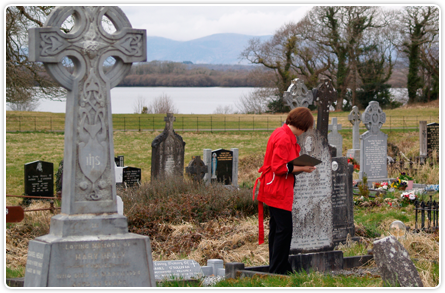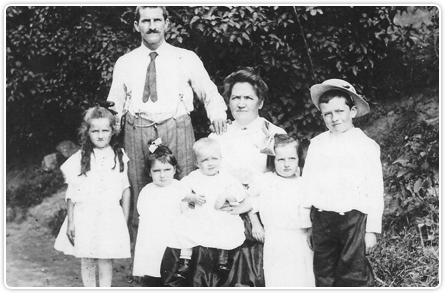AN INTRODUCTION TO GENEALOGY
ONE DAY COURSE FOR ANYBODY WHO WOULD LIKE TO LEARN MORE ABOUT GENEALOGY IN THE RUN UP TO ‘THE GATHERING 2013′.
Tourism providers
This course would ideally suit tourism providers and their staff who are in daily contact with tourists of Irish descent who wish to trace their Irish ancestry. We will look at what type of information you can put on your tourism business website/brochure to help your guests with their ancestral research.
Level
This course is open to all levels. You do not need any experience in genealogy, but you will need to have basic computer skills.
Aims
We will explain the methodology behind genealogy. We will show you how to research, find and locate genealogical documents (census, church, civil and land records). We will identify what genealogical documents are available online and offline for Irish family history research.

Objectives
The course will provide you with the confidence, knowledge, skills and tools to trace genealogical documents and advise your guests on the sources which are available for genealogical research in Ireland.
Duration
10 am to 4.30 pm
Capacity
The course is limited to 10 people per session. If you have a larger group arrangements can be made to accommodate your needs.

Genealogy for tourists - Introduction To Genealogy - Trace your Irish ancestors - Conversational Irish Language Archaeology for tourists
Course setting & materials:
The course will be delivered in a meeting room setting with the aid of power point slides and laptops.
We will provide you with the use of laptops for the duration of the course.
You will receive detailed course notes.
You will see samples of documents that you should be able to find for your own ancestors.
Price: On application.
Topics:
- Getting Started.
- Gathering and collating information.
- Establishing the identity and location of the townland.
- Defining the difference between civil and ecclesiastical parishes.
- Identifying the poor law union and applying this knowledge to find copies of civil certificates (birth, marriage and death certificates).
- Townland/Surname spelling variations – Tips on how to generate research results knowing the variations of spellings of townland and surnames.
- Census records – how to use the information on the census to find more genealogical documents.
- Church records – We will show you what church records are available for research online and offline. Techniques on how to generate research results.
- Civil records – How to use the indexes of Irish births, marriage and deaths to obtain copies of records. We will look at what further information can be obtained from civil records.
- Land records – We will look at land records which are available for research online and learn about land records which are available off-line and which may bring your family back to the 1780′s.
- Putting the information together, planning advanced research.
- How to help your guests in their research.
- Advising your guests in relation to online and offline sources, repositories and archives.
- What type of genealogical information you can put on your website/brochures to assist your guests.
- How you can tap into the worldwide ancestral tourism business.
- Preparing ‘The Gathering’ events/ancestral events.
- Creating links between your tourism business and your guests through the medium of ancestry.
What you will leave the course with:
- Following the course you will:
- Know the main sources of Irish genealogy.
- Have the knowledge of the online sources available for ancestral research.
- Know what type of genealogical collections each of the main archives in Ireland hold.
- Be able to research your family tree.
- Help and advice tourists that wish to trace their family.
- Know what type of genealogical information that you should be put in your businesses brochures/website to help your guests with their ancestral research.
Locations:
Kerry.
*We can travel to any location throughout Kerry and put on the course. We are a complete training unit and will supply all the laptops, projectors and equipment.
Cork, Limerick, Dublin can be discussed upon application.


